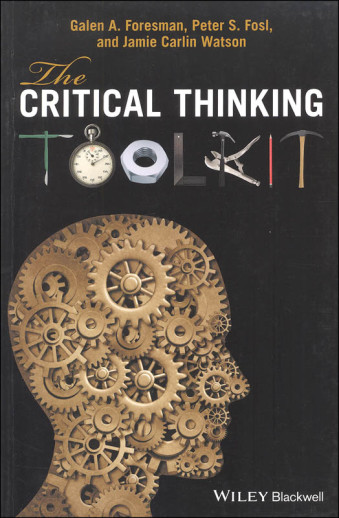We use cookies to make your experience better. To comply with the new e-Privacy directive, we need to ask for your consent to set the cookies. Learn more.
Critical Thinking Toolkit
This comprehensive collection of critical thinking basics is a wonderful guide to for any student who wants to learn to think critically rather than just accepting everything without question. Entries are broken down into 10 chapters, and chapters are broken down even further into individual and specific topics. The authors begin by giving the basic tools for critical thinking about arguments, deductive reasoning, detecting informal fallacies, thinking about induction, experience and error, justification, thinking about science, and rhetoric/critical theory/politics. At the end of each chapter is an exercise and study questions that vary in length. Because this book is divided topically, you could use it by reading straight through the book or go to the topics that interest you most. Included throughout the chapters are suggested reading lists and related topics within this book-just follow the trail. 358 pgs, pb. ~ Donna
The Critical Thinking Toolkit is a comprehensive compendium that equips readers with the essential knowledge and methods for clear, analytical, logical thinking and critique in a range of scholarly contexts and everyday situations.
- Takes an expansive approach to critical thinking by exploring concepts from other disciplines, including evidence and justification from philosophy, cognitive biases and errors from psychology, race and gender from sociology and political science, and tropes and symbols from rhetoric
- Follows the proven format of The Philosopher's Toolkit and The Ethics Toolkit with concise, easily digestible entries, "see also recommendations that connect topics, and recommended reading lists
- Allows readers to apply new critical thinking and reasoning skills with exercises and real life examples at the end of each chapter
- Written in an accessible way, it leads readers through terrain too often cluttered with jargon
- Ideal for beginning to advanced students, as well as general readers, looking for a sophisticated yet accessible introduction to critical thinking
| Product Format: | Paperback |
|---|---|
| Brand: | Wiley Blackwell |
| Author: | Galen A. Foresman, Peter S. Fo |
| Grades: | 7-12 |
| ISBN: | 9780470658697 |
| Length in Inches: | 9 |
| Width in Inches: | 6 |
| Height in Inches: | 0.625 |
| Weight in Pounds: | 1.05 |

